New poll: Voters want Democrats to win in NJ, VA and in 2026, as they push back on Trump
Plus: Voters trust Democrats more than Republicans to handle the economy; a majority says Trump is acting above the law; and 62% say the country is off on the wrong track
This article reports results from the October Strength In Numbers/Verasight poll. You can read our previous poll releases here. Subscribers to Strength In Numbers can suggest a question for future polls here or leave them in the comments section below.
Summary of main poll findings:
Our new Strength in Numbers/Verasight poll finds Democrats up 7 points on the 2026 U.S. House generic ballot, a public that prefers checks and balances over unilateral presidential action, that 55% of voters think Donald Trump is “acting like he is above the law, consolidating power like a king,” and a majority opposed to several high-profile presidential executive actions — as well as most of Trump’s policy agenda.
Additionally, selecting from a set of 11 policy areas, U.S. adults rank the economy (18%) and inflation (30%) as the most important problems (MIP) facing the nation today. Regardless of their individual MIPs, voters tell us they trust the Democratic Party more to handle their top issue by a margin of 46-39.
From the national vantage point, voters say they want Democrats to win the elections in New Jersey (42-36) and Virginia (43-36) — and the vast majority of voters say those contests are at least partly a referendum on Trump. They say the country is off on the wrong track, and want the parties to prioritize inflation, health care and social programs.
Methodology note: Verasight conducted this poll among 1,567 U.S. adult residents from October 24-29, 2025. It has a margin of sampling error of 2.6%. The survey was weighted to match the political and demographic characteristics of the U.S. adult population according to the U.S. Census Current Population Survey, as well as recent benchmarks for partisanship and past vote from official election results and the Pew Research Center.
Verasight uses mail, SMS text, and the internet to recruit a sample using hybrid sampling (both probability-based and non-probability techniques). To ensure independence of the research and editorial processes, Verasight handled recruitment, interviewing, and weighting the survey. Strength In Numbers conducts all analysis and editorial processes. SIN had input on questions, but did not participate in other methodological decisions.
You can download a PDF of the poll results, question wording, and a full methodology statement at the bottom of this page.
Voters disapprove of Trump’s use of executive powers
The clearest throughline of the survey is that voters want limits on presidential power. By a lopsided 71–19 margin, Americans say presidents should be constrained by constitutional checks and share power with Congress and the courts, not govern by fiat.
The vast majority of U.S adults say “The president should work within limits, share power with Congress and the courts, and compromise with other branches of government in order to accomplish his goals.” Fewer than one in five agree with the statement “The president should use strong unilateral action when necessary to achieve his goals, even if that means consolidating power from other branches [of government].”
This opposition to a consolidated executive shows up when we test the public’s support for some of Trump’s real and proposed uses of executive power. For example, majorities oppose the president defying court orders, reviving “Schedule F” to fire senior civil service employees, using emergency authorities for broad tariffs, directing the DOJ at political opponents, deploying active-duty troops domestically, and canceling already-authorized federal funds for infrastructure projects. Even on issues of foreign policy where the president typically has an advantage (such as striking boats the government has alleged contain drug traffickers), the public is opposed to Trump.
These are not just abstract cases of executive overreach. Examples such as these have colored the public’s impression of the president’s use of powers — and potentially even moved them to action. In our poll, a majority of 55% of adults says Trump is acting like he is above the law, while 30% see him as a strong leader still operating within constitutional boundaries.
The 2025 elections look like a partial referendum on Trump
From a national perch, and perhaps as a check on the president’s powers, respondents to our polls prefer Democrats to win both governors’ races on the ballot this fall. In New Jersey, 42% of adults say they want the Democratic candidate (Mikie Sherill) to win the election, and 43% want Abigail Spanberger to win in Virginia.
While these are not national elections, our poll still speaks to national discontent with the incumbent: 38% of adults nationally say the races in Virginia and New Jersey are mostly about supporting or opposing Trump’s agenda, with another 38% calling them a mix of national and local issues.
This sets up the 2026 election to be a clearer referendum on Trump. If it is, Democrats will likely win. Our polling finds Democrats leading in the race for the U.S. House popular vote — the sixth survey in a row to find a lead for the left.
If you limit the generic ballot to voters who say they are definitely going to or very likely to vote, the lead for the Democrats expands to +8 points.
Trump issue approval and direction of the country: both underwater
Trump’s overall job approval sits at 41–56 (–15) today, statistically unchanged since our previous poll. But there are signs of movement under the hood.
The president is +11 on border security, a new high for him, and roughly even on crime/public safety — some of the GOP’s best terrain historically.
Yet Trump is –26 on prices/inflation, –14 on the economy, and –21 on health care — the very topics voters say are most important to the country today (see next section). These are issues where Trump has scored enduringly low numbers in past surveys.
And asked directly how they feel about the promises Trump made on the economy in 2024, 63% of adults say he hasn’t delivered enough (25% say he has).
That mismatch helps explain why the country still reports a sour national mood: 30% say America is on the right track, compared to 62% who say it’s on the wrong track:
Strategically, this suggests Democrats should keep their 2026 campaign centered on affordability and health care, while tying process stories (court fights, executive overreach) back to everyday consequences: instability, uncertainty, and policy whiplash.
Democrats trusted more to handle “most important problem”
Voters’ top problems remain prices/inflation (30%), the economy/jobs (18%), health care (13%), and other government programs and social services (11%). Comparatively few Americans rate Republican-leaning issues, such as border security and immigration, as their most important issues (10% total).
It is not a mystery why Democrats are doing well in special elections and are favored to win most competitive elections this year: On the issues voters care about most, they prefer Democrats to handle policy. The Democrats now post small but meaningful advantages on handling prices/inflation and the economy, while maintaining wide leads on health care and education. Republicans retain their long-standing strengths on immigration, border security, and crime/public safety.
Here are the current party advantages for trust to handle the issues:
Comparing these numbers to those in our first poll in May, Democrats have expanded their lead on handling health care, government social programs, the economy, and inflation:
If you plot the Democrats’ advantage on each issue by the percentage of Americans who say that issue is the country’s most important problem, today, the Party’s advantage really starts sticking out. While Republicans have big leads on border security and immigration, many fewer Americans rate those issues as their top concern. On prices, the issue that decided the 2024 election, Democrats have a small but statistically significant, and growing, lead:
(The chart above is interactive. You can click on the unlabeled dots to reveal issue names.)
Another way to look at issue prioritization is to reduce it to a single question. We asked adults to tell us which party they preferred on their single most important issue. Democrats hold a 46–39 edge—essentially mirroring the generic congressional ballot, and Democrats’ lead in the polls of the governor’s race in New Jersey today.
We also asked Americans to report which issues they thought each party “generally cares most about”. These perceptions of party priorities mostly reinforce the findings above: Republicans are seen as focused on immigration and deportations, while Democrats are seen as focused on government programs and health care. Neither party is particularly aligned with the average voter in terms of their prioritization of prices; just 6% of adults say the Democrats “care most about” inflation, and only 4% say the same about Republicans.
Other findings:
We poll about a lot of topics, and can’t include everything in this write-up. Some additional questions include:
A plurality of Americans say they get their news from social media, podcasts, or online news aggregators/newsletters
63% of voters say that Congress should pass a federal law mandating that state redistricting plans are fair to each party
48% of adults say they would support a system where states are required to assign seats in the U.S. House in proportion to the number of votes won statewide, while 19% are opposed. 32% of respondents said “don’t know”
11% of respondents said they personally participated in the No Kings Day protests on Oct 18 (this is certainly too high — actual turnout was closer to 6-7m at the high end. polls have a problem over-representing very politically engaged people)
You can view responses for all our questions in the linked .pdf document.
The takeaway
Put simply, voters are frustrated with the direction of the country and do not feel like the incumbent party is representing their interests well. The average American wants the parties to help fix problems they feel every day, especially prices — but not if it means a presidency that bulldozes constitutional constraints on executive powers. Voters say they don’t approve of the way President Trump has expanded those powers, and his approval ratings on most issues — especially the ones voters say are most important to them — are markedly unpopular partly as a result.
In a big shift from 2024, voters now say they trust Democrats more than Republicans to handle the economy and inflation. Voters are also saying health care and general social spending are more important now than they were in 2024, tilting the policy landscape toward Democrats.
This is why Democrats hold a modest lead on the 2026 House generic ballot, and it’s why the party’s candidates are likely to win in most 2025 off-year races across the country.
That’s it for this month’s survey. You can download a full topline file and methodology statement using the link below:
For any questions, please email polling[AT]gelliottmorris.com.
Have a suggestion for next month’s poll? You know what to do!



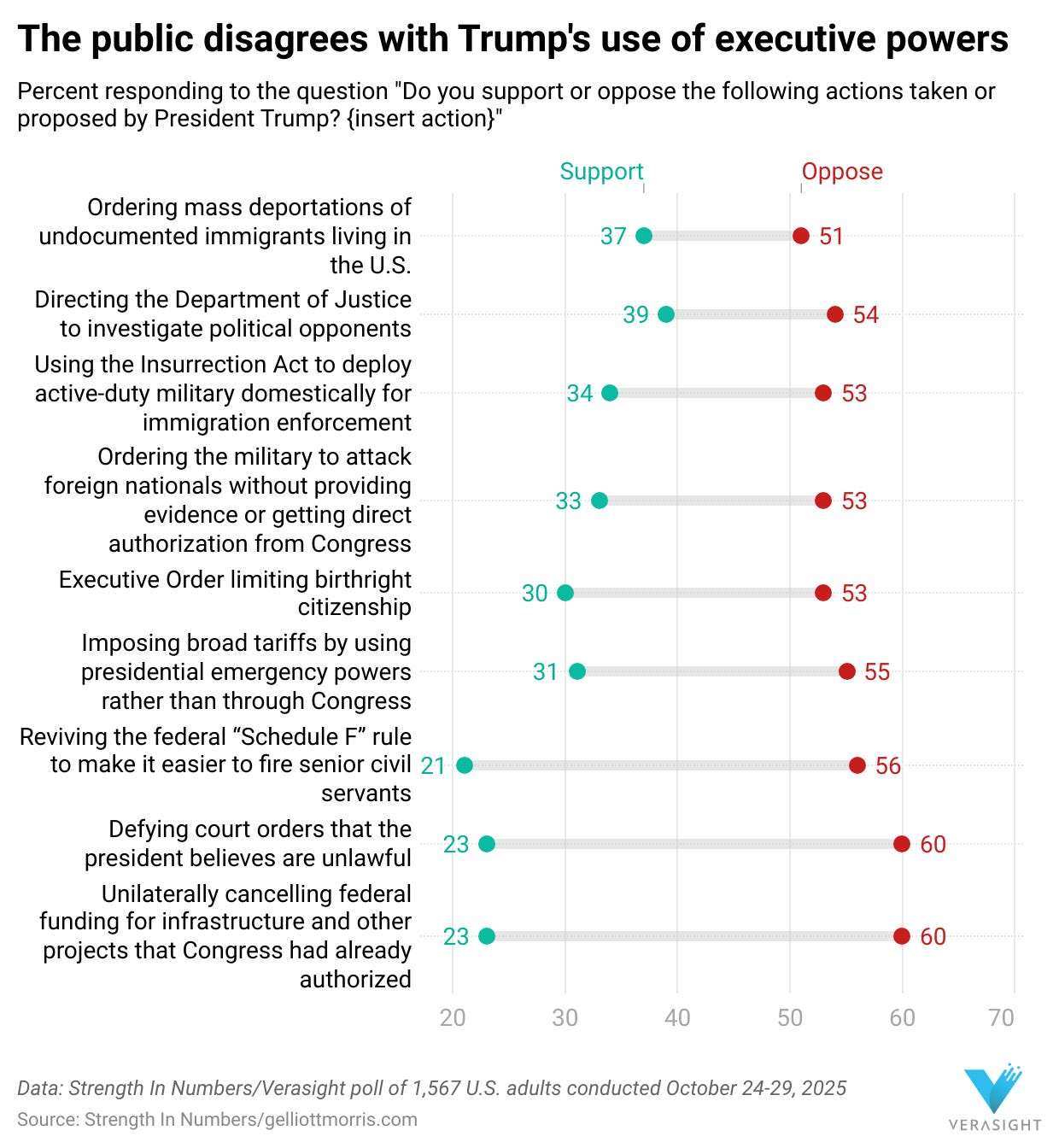
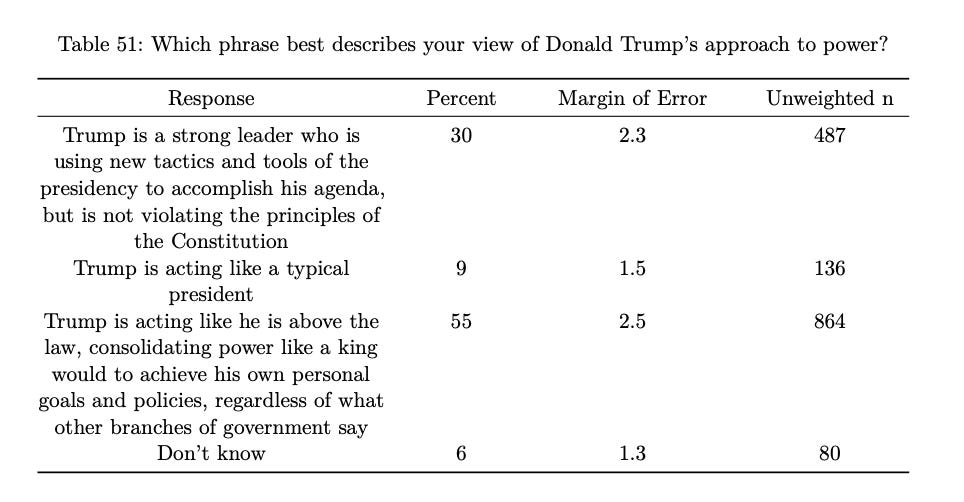
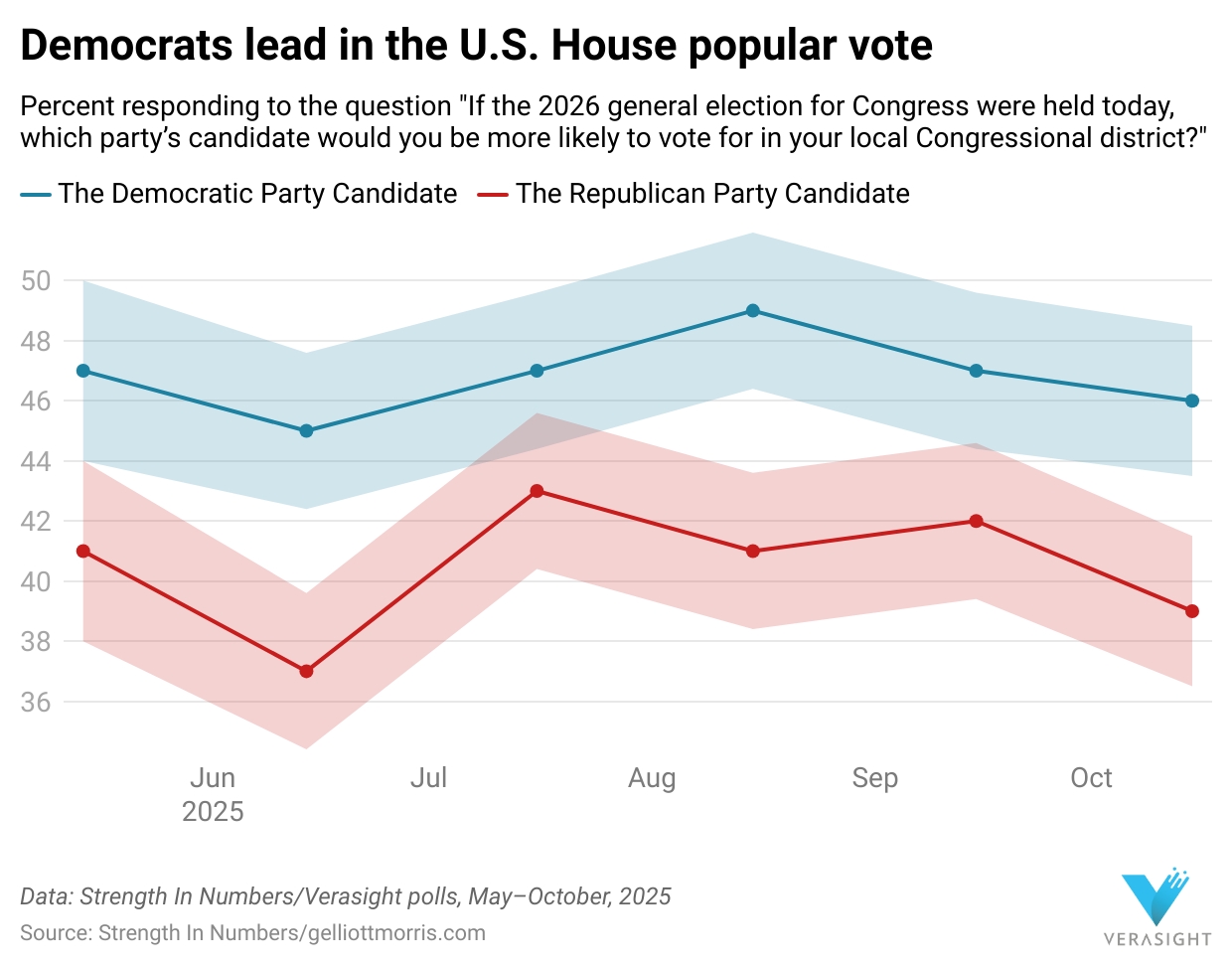
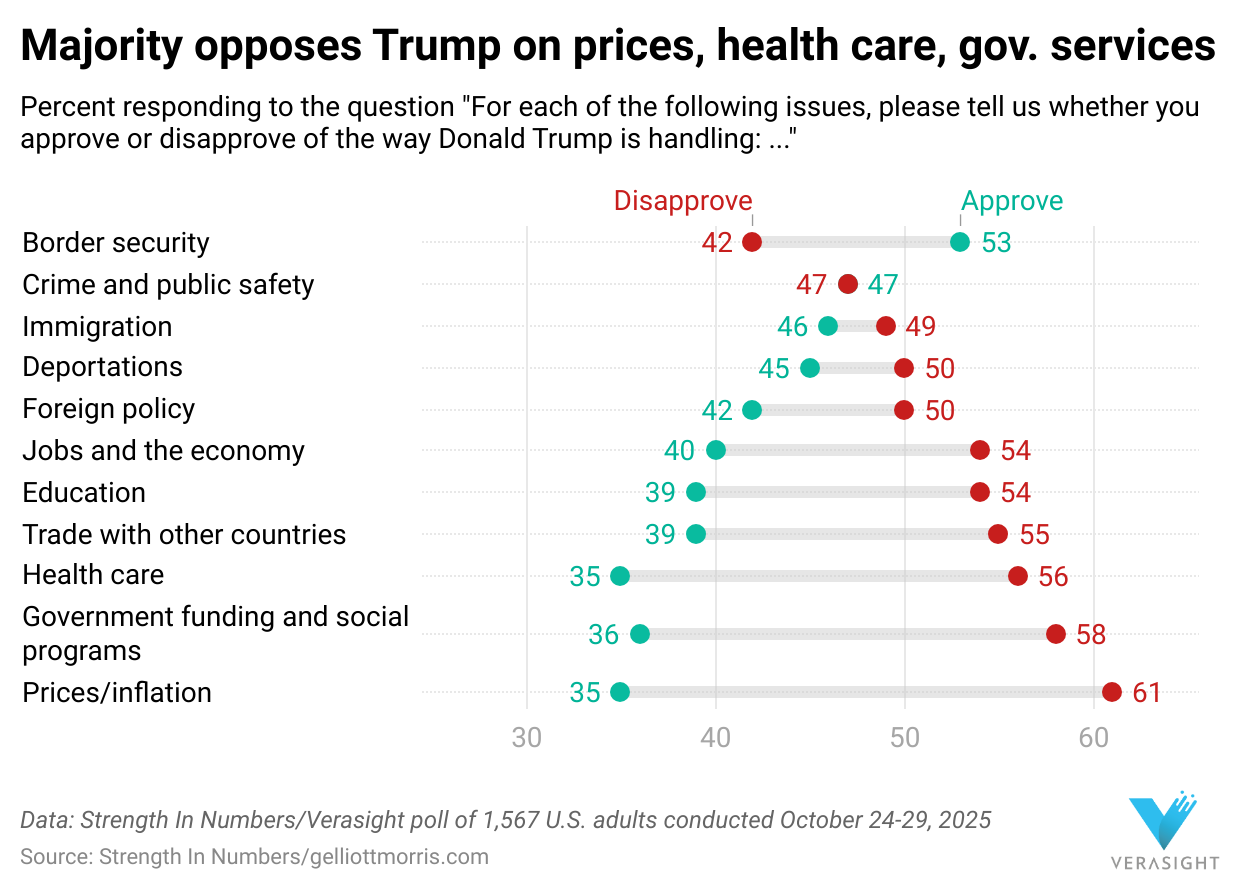
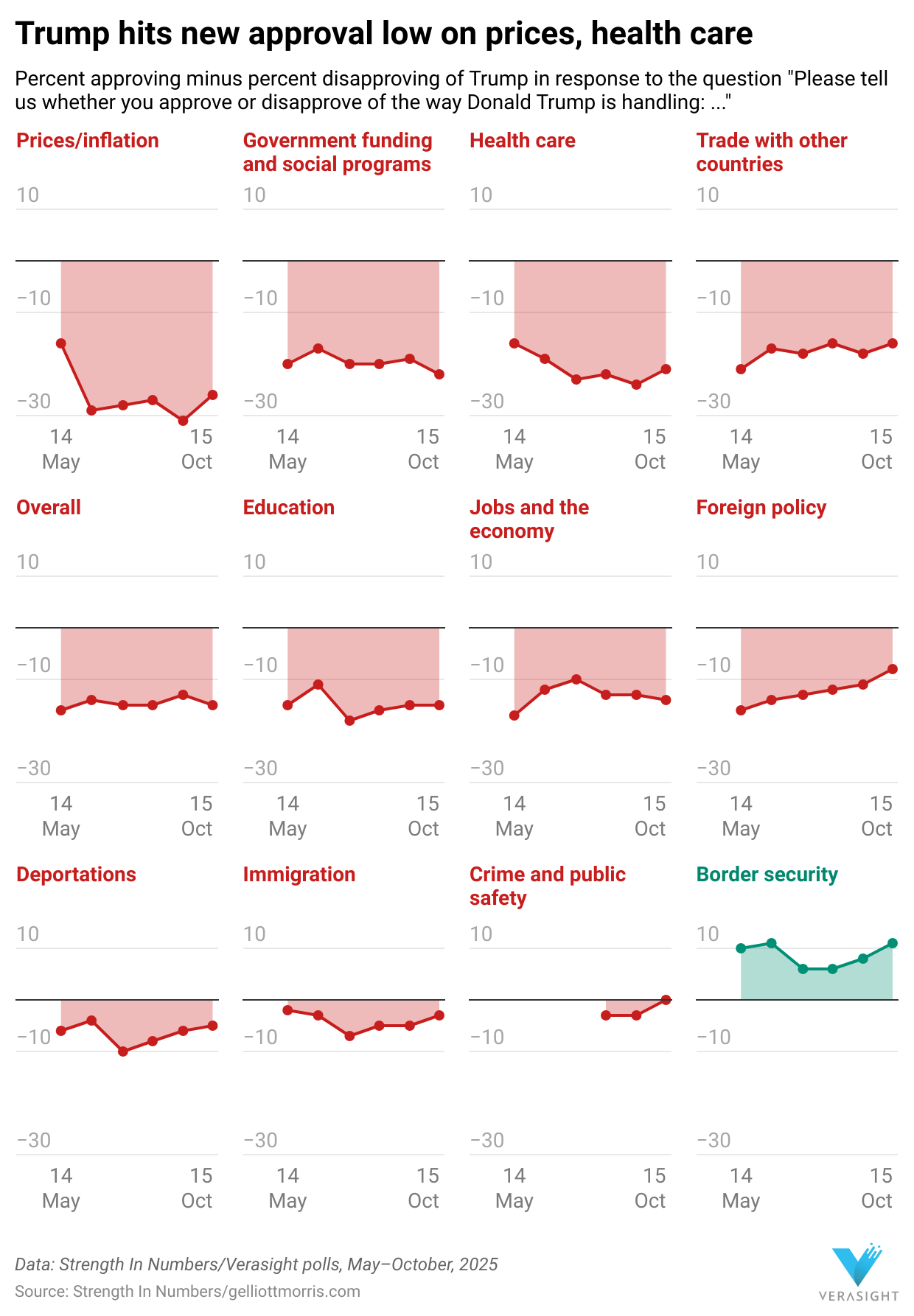
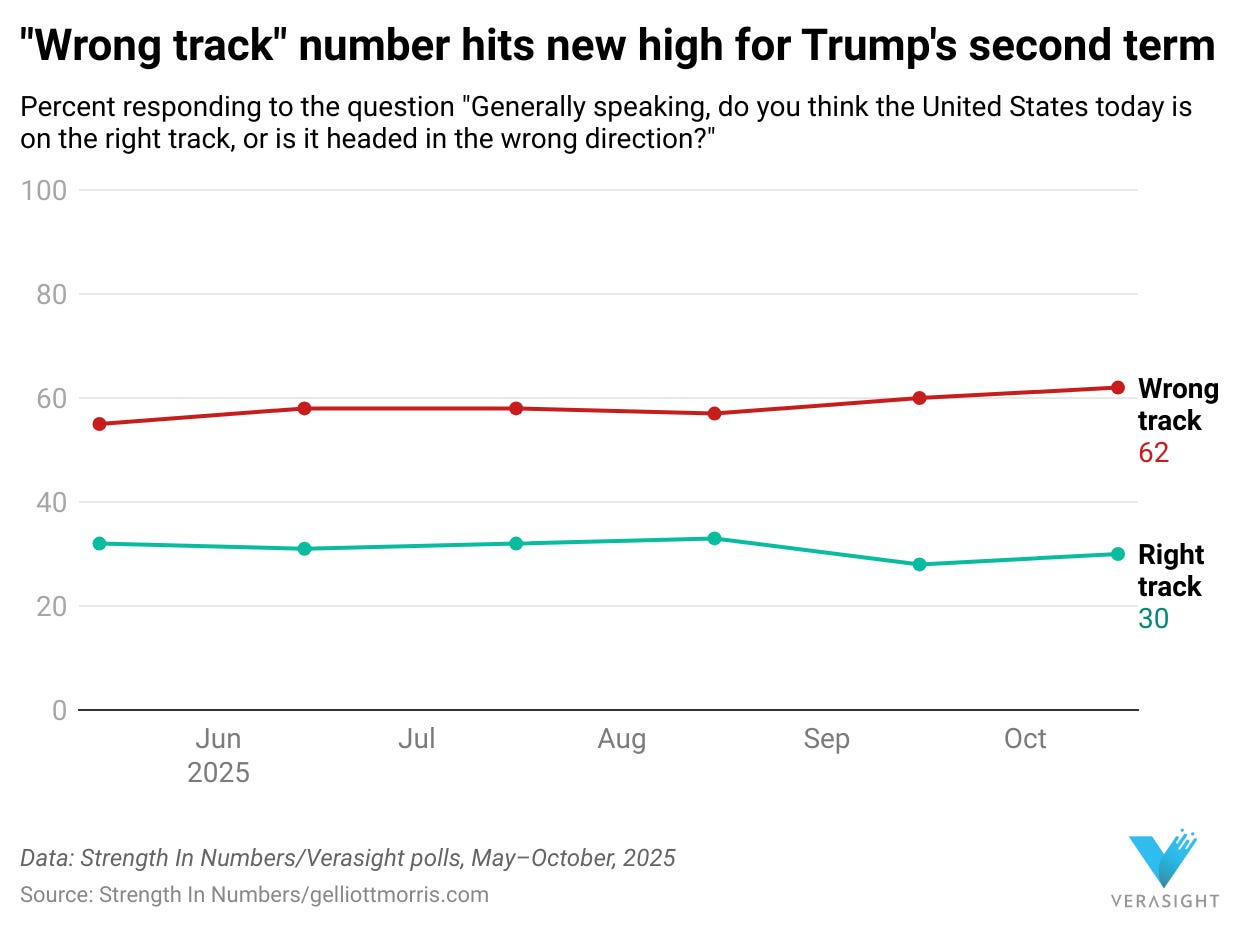
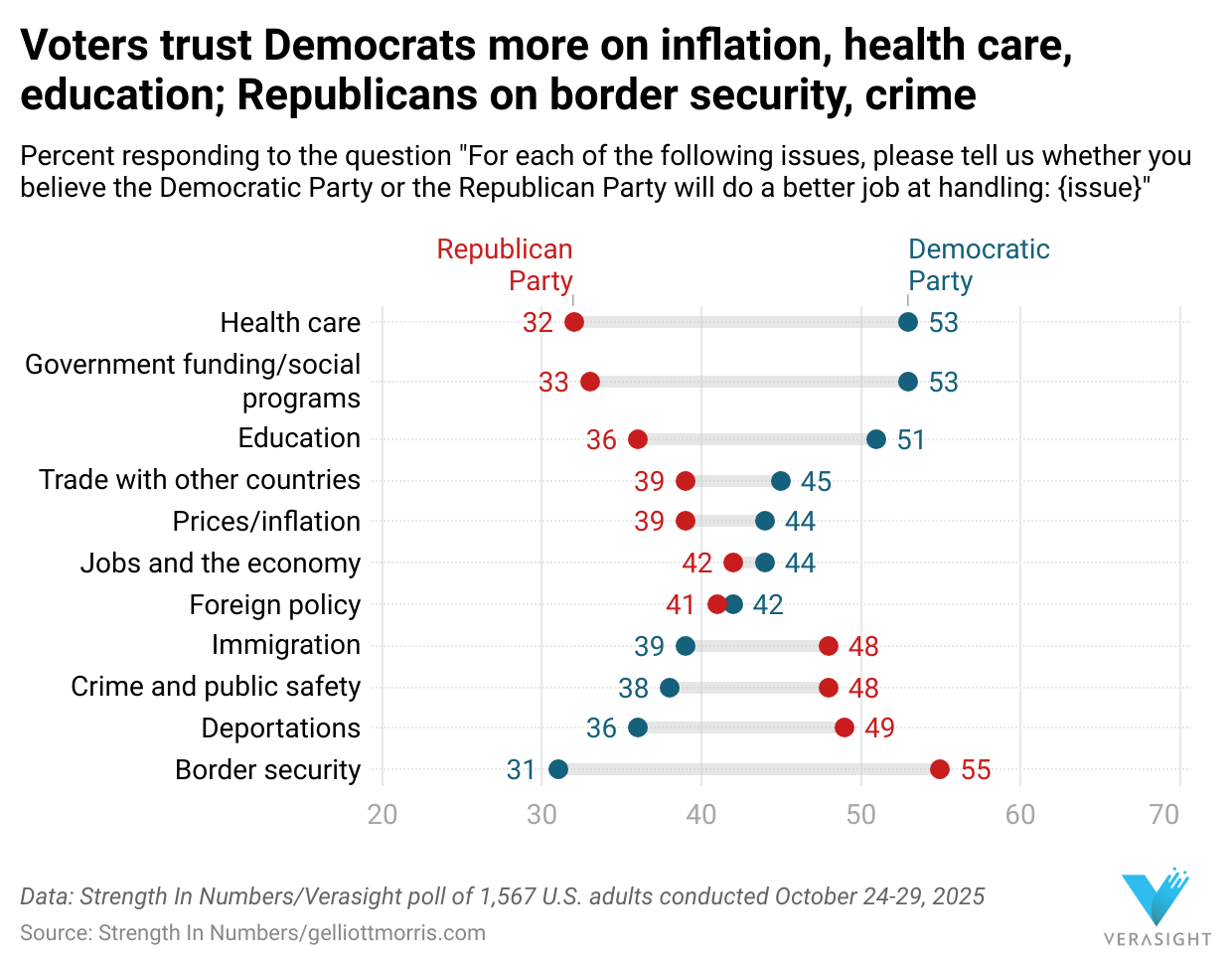
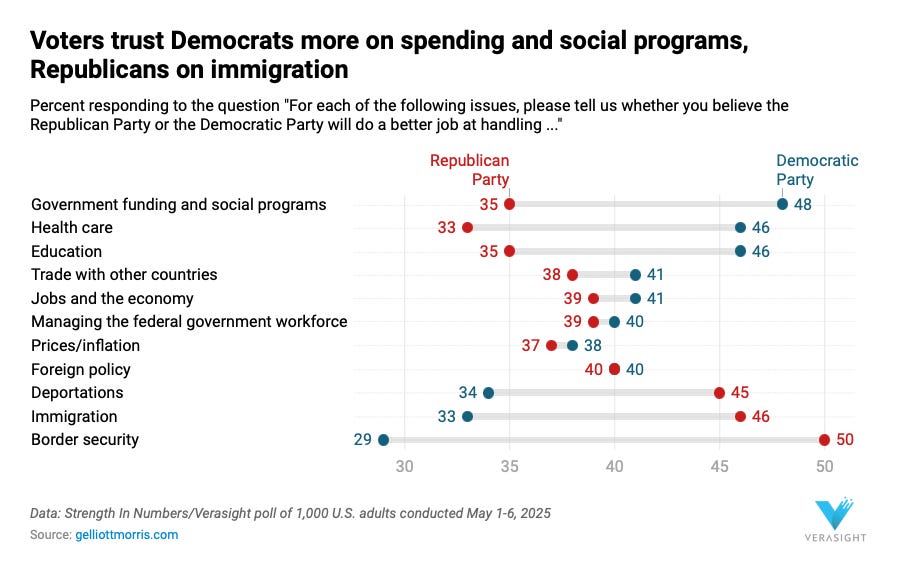
Thank you for including the most important question, IMO, which is a ranking of which issues are most important to voters. That was very helpful.
Quick note. In the section "Trump issue approval and direction of the country: both underwater", you talk about the Democrats' "2016" election strategy. I assume you mean "2026"....